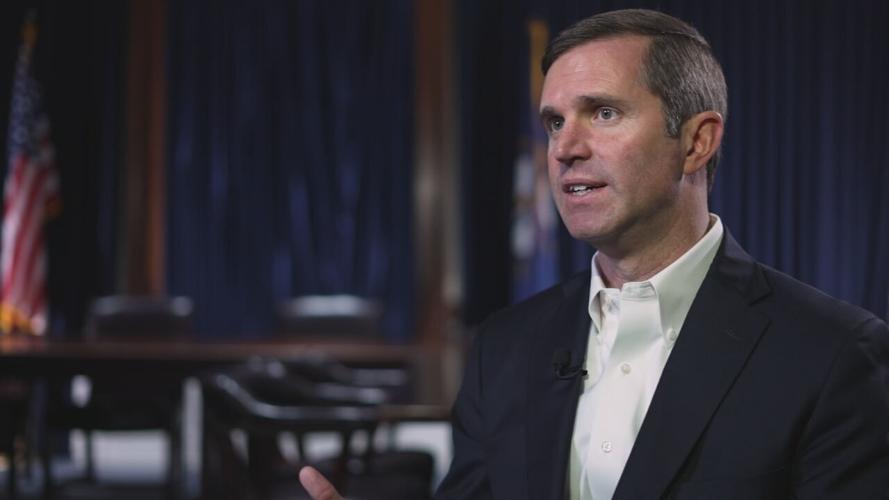LOUISVILLE, Ky. (WDRB) -- Kentuckians have dealt with two natural disasters in the last year while recovering from the pandemic.
Gov. Andy Beshear's first-term in office has been defined by responses to the COVID-19 pandemic, western Kentucky tornadoes and eastern Kentucky flooding. Beshear reflected on the successes and challenges in 2022 with WDRB News on Monday.
It’s that time of year. In a one on one with @GovAndyBeshear we talk about the successes of 2022 and the challenges. @WDRBNews pic.twitter.com/b8OnycNOTw
— Monica Harkins WDRB (@MonicaHarkinstv) December 12, 2022
2022 started with the state still reeling after tornadoes that ripped across western Kentucky in December 2021. 81 people died when the tornadoes moved through the state late Dec. 10 and continued into the morning hours of Dec. 11, 2021.
"I truly feel like we're coming out of a deep, dark historic moment," Beshear said. "We're a year later and we still have a lot of work to do, but I sense families being hopeful that better days are ahead."
Beshear said between state, federal and private insurers, $800 million has been provided for tornado relief.
For some families, that relief hasn't come yet or isn't enough.
Beshear announced Saturday the remaining money from the $52.3 million raised by the Team Western Kentucky Tornado Relief Fund will be committed to 10,000 recovering families for $1,000 each.
"That's everybody who filed an insurance claim that we were already able to help them with a deductible or got a single dollar or dime from FEMA," Beshear said. "We've got their information. They don't need to apply."
"It's in the mail. 10,000 separate payments takes a couple of days, but it's going out right now."
Gov. Andy Beshear speaks about challenges Kentuckians face in receiving FEMA funding.
Federal Emergency Management Agency (FEMA) is tasked with dolling out the largest amount of disaster recovery money. FEMA has distributed $15.8 million to 2,365 households across the area. But FEMA's Long Term Recovery Group project provides "provides financial and direct services to eligible individuals and households affected by a disaster who have uninsured or underinsured necessary expenses and serious needs."
FEMA said 6,043 households were not eligible for FEMA funds. Disaster survivors received an average of $6,100 for housing assistance and an average of about $3,000 for other needs.
"FEMA does some things really well, and needs to do other things a whole lot better," Beshear said. "We do see improvements, but improving isn't enough. When our people have suffered this much, they need to be a lot better."
In July, historic flooding destroyed towns, homes and people's livelihood in eastern Kentucky.
Surging floodwaters destroyed homes and businesses and caused significant damage to roads, bridges and water systems. The disaster caused at least 39 deaths, while thousands of families “lost everything,” the governor said.
"The west taught us a lot that helped us with the east," Beshear said.
As rebuilding continues, Kentuckians statewide battle inflation, supply chain issues and lack of workers to fill vacant jobs.
Beshear said the lack of workers is something to think relatively about.
"If you go back to March of 2020, and we could say, less than three years later, our economy would be so hot that we need more workers and more people in the workforce," Beshear said. "That's a challenge I would have taken immediately."
Kentucky ended the 2022 fiscal year with nearly a billion dollar surplus. General fund receipts totaled $14.7 billion, exceeding estimates by more than $900 million. Receipts grew by 14.6% over last year, making it the highest growth rate in 31 years.
The Republican super majority passed a trigger law to incrementally lower the state's income tax over the next few years, as long as the state reaches financial benchmarks along the way.
"I thought what we ought to be doing is temporarily lowering the sales tax overall," Beshear said. "If you want things to cost less, do something that makes them cost less."
Two battery manufacturing plants are being built in Glendale, Kentucky, a venture that will employ 5,000 people to produce batteries for future Ford and Lincoln electric vehicles. It's the biggest economic development deal in Kentucky history, with the state giving approval to a $250 million contribution of public money to BlueOval SK, the joint venture of Ford Motor Co. and South Korea's SK Group.
Gov. Andy Beshear speaks on his decision to sign an executive order for medical marijuana access in Kentucky.
Beshear exercised his executive power in November to change medical marijuana access. Beshear signed an executive order that will go into effect Jan. 1, 2023 that allows Kentuckians to possess and use eight or fewer ounces of medical marijuana if it's legally purchased in another state.
"Yes, it's legal, its power in the Constitution that is provided to the governor," Beshear said. "But listen there are lots of complications in it."
Overall, Beshear is hopeful to end the year looking up.
"I think we all feel both good to be back together but I hope we also feel hopeful about what's to come," Beshear said.
Related Stories:
- Gov. Andy Beshear files paperwork to seek reelection in 2023
- Crises forge Beshear's first term as Kentucky governor
- 'Free-for-all | GOP field to take on Beshear in Kentucky governor's race expands
- Kentucky budget surplus for 2022 totals nearly $1 billion
- Nearly $10 million in Kentucky tornado relief funds hasn't been given out
- More than $200 million in eastern Kentucky flood relief on the table as lawmakers convene in Frankfort
- Beshear signs executive order to legalize medical marijuana in Kentucky
Copyright 2022 WDRB Media. The Associated Press contributed to this report. All Rights Reserved.

















